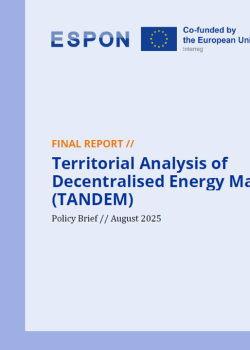Policy recommendations for the efficient and inclusive uptake of energy communities
How can we make energy communities more inclusive?

While energy communities hold significant promise for contributing to a just and sustainable energy transition, findings from this recent study reveal that inclusiveness is often limited and highly dependent on context, support mechanisms, and governance structures. What’s there to learn about the impacts and challenges of energy communities, especially in view of energy justice?
The brief by Energy Cities, Ecorys, Tecnalia and RESCoop.eu captures research findings on the conditions under which energy communities can thrive, focusing on social inclusiveness, territorial development, and the integration of market services. Based on this analysis, the report offers 10 targeted policy recommendations.
Policy recommendations for the efficient and inclusive uptake of energy communities
- Local informational support, including regional or local one-stop-shops, and targeted guidance, could be provided to different local actors relevant to the development of energy communities;
- Dedicated policy incentives to support delivery of social inclusiveness objectives in energy communities, such as financial, technical, administrative and legal support, and collaborative partnerships with actors that already engage disadvantaged and vulnerable groups.
- Local knowledge-sharing and promotional activities in less developed regions to inform the general public and local governments on the benefit of community-owned renewable projects, along with broader access to existing information tools.
- Promotion of co-ownership/co-development models between commercial RES developers and energy communities/citizens for larger projects. This can be supported via targets set at regional/local level, as well as the development of targeted incentives that promote co-ownership.
- A “Tech-Support Program” to boost the digital and technological capacity of less developed regions for energy community formation in combination with the development of step-by-step guides and trainings with expert facilitators to ensure the available tools and knowledge can be used by citizens and municipalities independently.
- Expand and simplify access to subsidies and financial instruments for energy communities, while ensuring they are tailored to the unique needs of community-driven, socially inclusive energy projects.
- Ensure that policies around the development of energy communities allows for initiatives that can cover a regional approach, including through adoption of definitions that allow for it.
- Include energy communities in mapping and planning around the development of renewable energy production technologies at the local and regional levels.
- Responsibility can be assigned to a national body to register, monitor and oversee energy communities. Otherwise, a non-governmental organisation could be funded to undertake this responsibility.
- Ensure registration procedures for energy communities are clear, transparent and simple, for initiatives that have already been established using a legal form that would qualify as an energy community.
In short: Energy communities are not inherently inclusive, but with the right financial incentives, multilevel governance approaches, and contextual alignment, they can be shaped into powerful instruments of social equity and territorial resilience.
This final report was conducted by Energy Cities, Ecorys, Tecnalia and RESCoop.eu within the framework of the ESPON 2030 Cooperation Programme, co-financed by the European Regional Development Fund.
